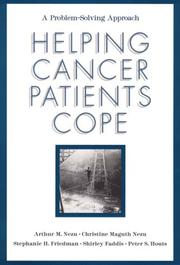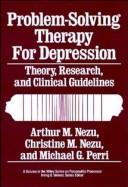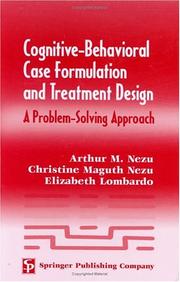| Listing 1 - 10 of 13 | << page >> |
Sort by
|

ISBN: 1557985332 Year: 1998 Publisher: [Place of publication not identified] American Psychological Association
Abstract | Keywords | Export | Availability | Bookmark
 Loading...
Loading...Choose an application
- Reference Manager
- EndNote
- RefWorks (Direct export to RefWorks)
Adjustment (Psychology) --- Cancer --- Neoplasms --- Adaptation, Psychological. --- Problem Solving. --- Medische psychologie --- Psychological aspects. --- psychology. --- gezondheidspsychologie --- Adjustment (Psychology). --- gezondheidspsychologie. --- Gezondheidspsychologie. --- Psychology. --- Adaptation, Psychological --- Problem Solving --- Psychology --- Diseases --- Thinking --- Learning --- Behavioral Sciences --- Behavior and Behavior Mechanisms --- Psychiatry and Psychology --- Behavioral Disciplines and Activities --- Mental Processes --- Psychological Phenomena and Processes --- Oncology --- Medicine --- Health & Biological Sciences --- Psychological aspects

ISBN: 1280201150 9786610201150 0306476290 030646246X Year: 2002 Publisher: New York : Kluwer Academic Publishers,
Abstract | Keywords | Export | Availability | Bookmark
 Loading...
Loading...Choose an application
- Reference Manager
- EndNote
- RefWorks (Direct export to RefWorks)
Practitioner's Guide to Empirically-Based Measures to Depression, the first volume in a series of clinical assessment handbooks, is intended to guide clinicians and researchers in choosing practical tools relevant for clinical assessment, intervention, and/or research in this area. This volume provides critical overviews of key assessment issues and available assessment tools in depression. It provides summary tables comparing and contrasting different instruments in terms of their time requirements, suitability, costs, administration, reliability, and validity. These `quick view grids' provide a rapid method of identifying and comparing potentially useful measures. Sample copies of 25 instruments in the public domain are included; for instruments commercially available, samples of instrument content and information about how to purchase them are provided. This remarkable compendium of information should serve as a valuable resource to practicing clinicians and to researchers who wish to develop state-of-the-science assessment strategies for clinical problems and to make informed choices about which devices best suit their purposes.
Depression, Mental. --- Clinical psychology. --- Psychology, clinical. --- Consciousness. --- Psychiatry. --- Clinical Psychology. --- Cognitive Psychology. --- Cognitive psychology. --- Medicine and psychology --- Mental health --- Psychology, Pathological --- Psychology, Cognitive --- Cognitive science --- Psychology --- Psychiatry --- Psychology, Applied --- Psychological tests --- Dejection --- Depression, Unipolar --- Depressive disorder --- Depressive psychoses --- Melancholia --- Mental depression --- Unipolar depression --- Affective disorders --- Neurasthenia --- Neuroses --- Manic-depressive illness --- Melancholy --- Sadness

ISBN: 019026165X 1281162981 9786611162986 0198041454 1435600959 9780198041450 9781281162984 0195304632 9780195304633 Year: 2008 Publisher: New York (N.Y.) Oxford University Press
Abstract | Keywords | Export | Availability | Bookmark
 Loading...
Loading...Choose an application
- Reference Manager
- EndNote
- RefWorks (Direct export to RefWorks)
This edited volume provides both conceptual and practical information for conducting and evaluating evidence-based outcome studies. It encompasses psychotherapy research for traditional mental health disorders (eg. depression, anxiety), as well as psychosocial-based treatments provided to medical patient populations to have impact either on the disease process itself (pain, cardiovascular risk) or to improve the quality of life of such individuals. This is a hands-on book, whose major emphasis is on the practical nuts-and-bolts implementation of psychosocial-based RCTs from conception to completion.
Evidence-based psychiatry. --- Psychiatry --- Psychotherapy --- Clinical trials. --- Controlled clinical trials --- Patient trials of new treatments --- Randomized clinical trials --- Trials, Clinical --- Clinical medicine --- Human experimentation in medicine --- Psychagogy --- Therapy (Psychotherapy) --- Mental illness --- Clinical sociology --- Mental health counseling --- Medicine and psychology --- Mental health --- Psychology, Pathological --- Evidence-based medicine --- Research --- Methodology. --- Treatment --- Decision making --- Algemene psychologie --- Evidence-Based Medicine. --- Randomized Controlled Trials --- Treatment Outcome. --- algemene overzichten. --- methods. --- Methods.
Book
ISBN: 0199733252 9780199733255 Year: 2015 Publisher: New York: Oxford university press,
Abstract | Keywords | Export | Availability | Bookmark
 Loading...
Loading...Choose an application
- Reference Manager
- EndNote
- RefWorks (Direct export to RefWorks)
Cognitive Therapy --- Cognitive therapy --- Behavior therapy --- Thérapie cognitive. --- Thérapie comportementale. --- Thérapie cognitive. --- Thérapie comportementale.
Film
Year: 2018 Publisher: Washington (D.C): American psychological association,
Abstract | Keywords | Export | Availability | Bookmark
 Loading...
Loading...Choose an application
- Reference Manager
- EndNote
- RefWorks (Direct export to RefWorks)
Emotion-centered problem-solving therapy is a transdiagnostic approach that teaches individuals, via an experiential learning framework, a series of skills geared to foster their flexibility and resilience when coping with major life stressors. Emotion-centered problem-solving therapy is the updated version of problem-solving therapy, which has more than 30 years of demonstrated efficacy regarding multiple clinical disorders, particularly depression. This newer version provides additional tools to help people better understand and regulate negative emotionality in order to more successfully problem-solve stressful life problems. In this video program, Dr. Arthur M. Nezu works with a client who is dealing with substantial life setbacks with the goal of enhancing his ability to both learn and apply the problem-solving skills. Dr. Christine Maguth Nezu discusses various teaching moments identified within this clinical demonstration that illustrate the four major toolkits that embody emotion-centered problem-solving therapy.
Book
ISBN: 9780199983360 Year: 2014 Publisher: [New York, N.Y.] Oxford University Press
Abstract | Keywords | Export | Availability | Bookmark
 Loading...
Loading...Choose an application
- Reference Manager
- EndNote
- RefWorks (Direct export to RefWorks)
This Handbook provides a contemporary and comprehensive illustration of the wide range of evidence-based psychotherapy interventions currently subsumed under the rubric of cognitive and behavioral therapies (CBT). Currently there exists a wide selection of strategies and approaches for various clinical problem areas, as well as several interventions designed to promote living well, achieving life goals, and building one’s resilience. Contributors include internationally prominent individuals in cognitive and behavioral theory, assessment, and treatment. Moreover, this volume was developed to provide students, clinicians, and researchers with an understanding regarding each treatment approach and target treatment population. Each chapter provides valuable insights concerning the theory, development, and future directions of cognitive and behavioral interventions. Our intention as co-editors was to provide a collection of intervention chapters that takes the reader through underlying theory and philosophies inherent to a cognitive and behavioral approach to treatment. However, we also include chapters regarding case formulation, requisite professional cognitive and behavioral competencies, and the integration of multiculturalism into clinical practice. In this manner, we hope to provide additional context and advice regarding how to integrate the collective wealth of information contained across the chapters. The Handbook was carefully edited so as to clarify terms present in the literature regarding cognitive and behavioral interventions. In addition, readers can learn the rich variety, similarities, and differences present among the plethora of C&BT interventions included in the volume.

ISBN: 0471628859 Year: 1989 Publisher: New York (N.Y.) : Wiley,
Abstract | Keywords | Export | Availability | Bookmark
 Loading...
Loading...Choose an application
- Reference Manager
- EndNote
- RefWorks (Direct export to RefWorks)
A manual for the diagnosis and treatment of depression--based on a new, integrated view of the nature, course, and treatment of depression. Depression is one of the most prevalent mental health problems. The authors present a theoretical problem-solving model, which unifies the strengths of cognitive-behavioral therapies, all supported by an overview of relevant research. They then provide a step-by-step practical guide to conducting problem-solving therapy for depressed patients. The clinical guidelines and case study examples are stimulating, and set this book apart from those simply describing research findings.
Psychiatry --- Depression, Mental --- Problem-solving therapy. --- Depression --- Models, Psychological. --- Problem Solving. --- Treatment. --- therapy. --- Therapy.

ISBN: 1281811335 9786611811334 0826122868 9780826122865 082612285X 9780826122858 Year: 2004 Publisher: New York, NY Springer Pub. Co.
Abstract | Keywords | Export | Availability | Bookmark
 Loading...
Loading...Choose an application
- Reference Manager
- EndNote
- RefWorks (Direct export to RefWorks)
This user-friendly guide will help the clinician develop Cognitive-Behavioral treatment plans for 11 common psychological disorders (e.g., major depressive disorder, generalized anxiety, borderline personality disorder, anger problems). Based on a problem-solving model and empirical literature, the authors focus on two major clinical tasks involved in this process: case formulation and treatment design. They delineate short-term goals, long-term goals, treatment targets, and potential interventions. Appendices include ""quick guides to CBT treatment planning"" for the 11 disorders and selected
Cognitive therapy. --- Psychiatry --- Problem-solving therapy. --- Cognitive-behavior therapy --- Cognitive-behavioral therapy --- Cognitive psychotherapy --- Psychotherapy --- Problem-centered therapy --- Problem-oriented therapy --- Mediation therapy --- Differential therapeutics in psychiatry --- Case conceptualization in psychiatry --- Case formulation in psychiatry --- Conceptualization of cases in psychiatry --- Formulation of cases in psychiatry --- Case formulation. --- Differential therapeutics. --- Methodology --- Case conceptualization
Book
ISBN: 0826109411 9780826109415 9781306083898 1306083893 9780826199195 9780826109408 0826109403 Year: 2013 Publisher: New York SpringerPublishing Company
Abstract | Keywords | Export | Availability | Bookmark
 Loading...
Loading...Choose an application
- Reference Manager
- EndNote
- RefWorks (Direct export to RefWorks)
Problem-solving therapy (PST) has been increasingly used to treat a great variety of health and mental health problems due to its flexibility and proven effectiveness. This text, written by the co-developers of PST, is a comprehensive and detailed manual of how to apply PST for a variety of populations and situations. The book reflects the most current research and applications of PST and provides specific treatment guidelines, sample client-therapist dialogues, clinical exercises and activities, homework assignments, client handouts, clinical case examples, and worksheets. These are based on
Problem-solving therapy. --- Problem-centered therapy --- Problem-oriented therapy --- Psychotherapy --- Mediation therapy --- Problem Solving. --- methods --- Executive Function
Book
ISBN: 0190230576 0199700230 9780199700233 1306168511 9781306168519 9780195382327 0195382323 Year: 2014 Publisher: Oxford : Oxford University Press,
Abstract | Keywords | Export | Availability | Bookmark
 Loading...
Loading...Choose an application
- Reference Manager
- EndNote
- RefWorks (Direct export to RefWorks)
Devoted to providing readers with a state of the art guide to the competencies required for the specialty practice of cognitive and behavioral psychology, Specialty Competencies in Cognitive and Behavioral Psychology describes and defines the foundational and functional competencies that guide best practices in this specialty. Influenced by a profession-wide recognition of the unique and distinct nature among psychological specialty practice as well as efforts to define professional competence, this book illustrates how cognitive and behavioral psychologists actualize each area of professional
Cognitive psychology. --- Behaviorism (Psychology) --- Psychologists. --- Psychology --- Behavioral scientists --- Behavioralism (Psychology) --- Behavioristic psychology --- Behaviouralism (Psychology) --- Behaviourism (Psychology) --- Scientific behaviorism --- Psychology, Cognitive --- Cognitive science --- Practice.
| Listing 1 - 10 of 13 | << page >> |
Sort by
|

 Search
Search Feedback
Feedback About UniCat
About UniCat  Help
Help News
News